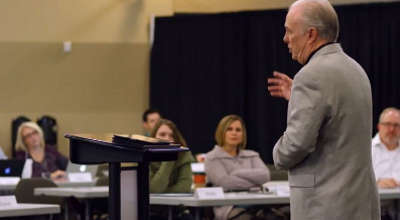In the fourth of a six-part series, LifeWay Research takes a look at how churches have turned a corner with the help of the Transformational Church Assessment Tool.

Page 161 of 209

In the fourth of a six-part series, LifeWay Research takes a look at how churches have turned a corner with the help of the Transformational Church Assessment Tool.

A recently released LifeWay Research data poll not only shows this, but also yields some other surprising results.

Here's how developing a group of healthy churches with a common goal of serving others, sharing the gospel and pursuing Jesus can help your movement gain momentum.

Find out how the National Institute of Christian Leadership, under the guidance of Dr. Mark Rutland, has become a solid tool for pastors and ministry leaders.

What would happen if you went into your neighborhood or your home and really started treating people just like Jesus did? What if you were unshocked by mud and motivated by mercy?

Do you ever feel you are in over your head? What can you do to fix the situation?

How are salaries determined for ministry leaders in your church?

What has been your experience regarding negative pastoral departures? What do you think of these five circumstances?

Have you resisted complacency in your church? How can you avoid it?

Understanding how emotions can work for you or against you is key to becoming a healthy leader and cultivating a healthy culture on your team.

Is your church providing an informal atmosphere for people connect with others to talk about life and to help them heal from life's hurts?

Isn't the most important role of the church in today's society to strengthen the nuclear family in our congregations and to empower parents to train their children with a biblical worldview?

Are we keeping our love for people alive, even in an age when rejecting Jesus is the cultural thing to do?

Is it a good thing that churches are trying to be culturally relevant these days?

What is your perspective regarding pastors and office hours? What should be the expectations of the church members about their schedules?

You may think that some of the things that come to your mind during a service are true. Why are you allowing the enemy to deceive you when the Lord says you are already victorious?

Just because you have failed doesn't mean you're a failure. What valuable lessons have your past failures taught you?

Do you die every day to yourself, as it says in 1 Corinthians 15:31? How often do you humble yourself before the Lord?

Have we gotten so caught up in the pleasures of our worldly lusts that our devotion to Christ has been compromised? Are we deaf to the Holy Spirit's conviction?

Is it simply not better to stop worrying, pray about everything, give thanks and focusing on the right things?